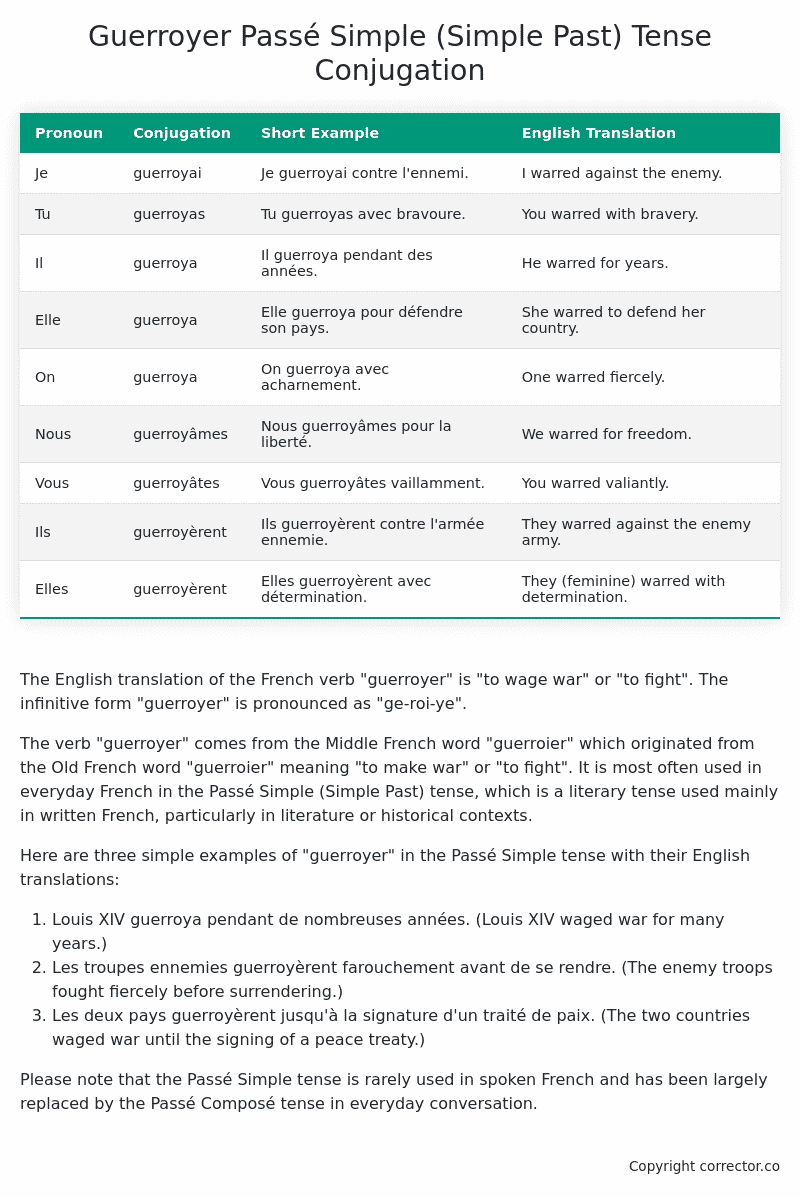Passé Simple (Simple Past) Tense Conjugation of the French Verb guerroyer
Introduction to the verb guerroyer
The English translation of the French verb “guerroyer” is “to wage war” or “to fight”. The infinitive form “guerroyer” is pronounced as “ge-roi-ye”.
The verb “guerroyer” comes from the Middle French word “guerroier” which originated from the Old French word “guerroier” meaning “to make war” or “to fight”. It is most often used in everyday French in the Passé Simple (Simple Past) tense, which is a literary tense used mainly in written French, particularly in literature or historical contexts.
Here are three simple examples of “guerroyer” in the Passé Simple tense with their English translations:
- Louis XIV guerroya pendant de nombreuses années. (Louis XIV waged war for many years.)
- Les troupes ennemies guerroyèrent farouchement avant de se rendre. (The enemy troops fought fiercely before surrendering.)
- Les deux pays guerroyèrent jusqu’à la signature d’un traité de paix. (The two countries waged war until the signing of a peace treaty.)
Please note that the Passé Simple tense is rarely used in spoken French and has been largely replaced by the Passé Composé tense in everyday conversation.
Table of the Passé Simple (Simple Past) Tense Conjugation of guerroyer
| Pronoun | Conjugation | Short Example | English Translation |
|---|---|---|---|
| Je | guerroyai | Je guerroyai contre l’ennemi. | I warred against the enemy. |
| Tu | guerroyas | Tu guerroyas avec bravoure. | You warred with bravery. |
| Il | guerroya | Il guerroya pendant des années. | He warred for years. |
| Elle | guerroya | Elle guerroya pour défendre son pays. | She warred to defend her country. |
| On | guerroya | On guerroya avec acharnement. | One warred fiercely. |
| Nous | guerroyâmes | Nous guerroyâmes pour la liberté. | We warred for freedom. |
| Vous | guerroyâtes | Vous guerroyâtes vaillamment. | You warred valiantly. |
| Ils | guerroyèrent | Ils guerroyèrent contre l’armée ennemie. | They warred against the enemy army. |
| Elles | guerroyèrent | Elles guerroyèrent avec détermination. | They (feminine) warred with determination. |
Other Conjugations for Guerroyer.
Le Present (Present Tense) Conjugation of the French Verb guerroyer
Imparfait (Imperfect) Tense Conjugation of the French Verb guerroyer
Passé Simple (Simple Past) Tense Conjugation of the French Verb guerroyer (You’re reading it right now!)
Passé Composé (Present Perfect) Tense Conjugation of the French Verb guerroyer
Futur Simple (Simple Future) Tense Conjugation of the French Verb guerroyer
Futur Proche (Near Future) Tense Conjugation of the French Verb guerroyer
Plus-que-parfait (Pluperfect) Tense Conjugation of the French Verb guerroyer
Passé Antérieur (Past Anterior) Tense Conjugation of the French Verb guerroyer
Futur Antérieur (Future Anterior) Tense Conjugation of the French Verb guerroyer
Subjonctif Présent (Subjunctive Present) Tense Conjugation of the French Verb guerroyer
Subjonctif Passé (Subjunctive Past) Tense Conjugation of the French Verb guerroyer
Subjonctif Imparfait (Subjunctive Imperfect) Tense Conjugation of the French Verb guerroyer
Subjonctif Plus-que-parfait (Subjunctive Pluperfect) Tense Conjugation of the French Verb guerroyer
Conditionnel Présent (Conditional Present) Tense Conjugation of the French Verb guerroyer
Conditionnel Passé (Conditional Past) Tense Conjugation of the French Verb guerroyer
Conditionnel Passé II (Conditional Past II) Tense Conjugation of the French Verb guerroyer
L’impératif Présent (Imperative Present) Tense Conjugation of the French Verb guerroyer
L’impératif Passé (Imperative Past) Tense Conjugation of the French Verb guerroyer
L’infinitif Présent (Infinitive Present) Tense Conjugation of the French Verb guerroyer
L’infinitif Passé (Infinitive Past) Tense Conjugation of the French Verb guerroyer
Le Participe Présent (Present Participle) Tense Conjugation of the French Verb guerroyer
Le Participe Passé (Past Participle) Tense Conjugation of the French Verb guerroyer
Struggling with French verbs or the language in general? Why not use our free French Grammar Checker – no registration required!
Get a FREE Download Study Sheet of this Conjugation 🔥
Simply right click the image below, click “save image” and get your free reference for the guerroyer Passé Simple tense conjugation!

Guerroyer – About the French Passé Simple (Simple Past) Tense
Formation
Usage
Narration
Historical Context
Interactions with other tenses
Passé Composé
Imparfait
Conditional and Subjunctive
Summary
I hope you enjoyed this article on the verb guerroyer. Still in a learning mood? Check out another TOTALLY random French verb conjugation!


